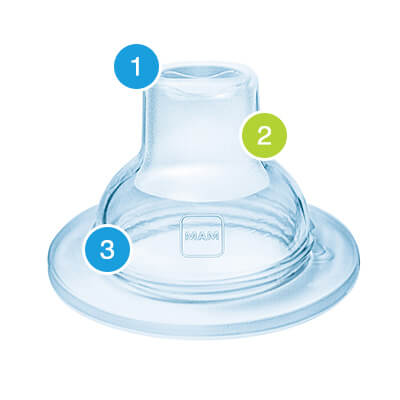2 boquillas extra suaves para biberón
Con la boquilla ultra-soft se logra una transición especialmente sencilla de la lactancia o el biberón al vaso.
- Hermética - perfecta para entrenar las aptitudes bebedoras del bebé
- Los bebés se adaptan fácilmente a la tetina MAM que, gracias a su superficie de silicona SkinSoftTM y a su exclusiva forma plana, ofrece una sensación muy familiar
- Se adapta a todos los biberones MAM y vasos entrenadores

1. RANURA DE APERTURA
Antiderrames, perfecto para que el bebé desarrolle las habilidades para beber. Los bebés pueden controlar por sí solos el caudal.
2. TETINA DE SILICONA SKINSOFT™
Aceptada por el 94%* de los bebés.
3. FORMA SIMÉTRICA
Se adapta siempre a la boca del bebé.
Aceptación de la tetina en un 94 %: los bebés la aceptan fácilmente por su sensación familiar
Todos los productos MAM están fabricados con materiales libres de BPA y BPS.
MAM SkinSoft™: aceptada fácilmente por los bebés, pues la reconocen como algo familiar
A prueba de derrames - para una primera alimentación independiente
Para bebés de 4 meses
¹ Estudio de mercado 2009-2020, realizado con 1,572 bebés.
INNOVACIÓN DESARROLLADA CONJUNTAMENTE CON MÉDICOS
GALARDONADA CON EL PREMIO A LA SEGURIDAD DE PRODUCTO DE LA UE 2019
Un bebé a los seis meses tiene las defensas suficientemente desarrolladas. A partir de esta edad es suficiente esterilizar el biberón y la tetina esporádicamente. Se recomienda volver a esterilizar diariamente en caso de que el bebé esté enfermo.
Four-month-old babies love drinking from a cup. The MAM Cup range provides them with the ideal support here. This will ensure that baby makes the perfect transition from breastfeeding or bottle feeding to independent drinking.
La tetina del biberón se lava muy fácilmente con agua y un detergente suave o bien se coloca en la gaveta superior del lavavajillas.
Bisphenol A (BPA) is an important component for the manufacturing of polycarbonate (PC), whereas Bisphenol S (BPS) is an organic chemical used to make polysulfone. Among other items, food packaging, plastic utensils and baby bottles are just a few examples of products made with PC, whereas the main usage of BPS is in thermal papers and inks. The problem: Trace amounts of chemical substances gradually leach out of the plastic into the food and might eventually get into the body. This can affect small children and infants in particular.
As a result of exposure to BPA, experts and studies have seen disruptions to the hormone system and brain, diabetes and heart damage as well as an increased risk of cancer. Although scientific evidence is not yet conclusive, the European Commission - based on the precautionary principle - has banned the usage of BPA in baby bottles in order to protect the health and safety of babies and small children.
Before the bottle is placed in the water bath or the bottle warmer, the sealing cap is always removed. The contents of the bottle must not boil – so do not pour any boiling liquids into it!
Before feeding begins, the bottle should be dried using a clean cloth.